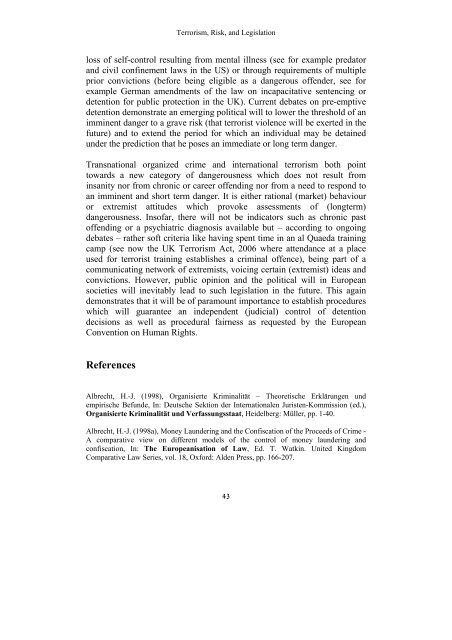222467to222472
222467to222472
222467to222472
Create successful ePaper yourself
Turn your PDF publications into a flip-book with our unique Google optimized e-Paper software.
Terrorism, Risk, and Legislation<br />
loss of self-control resulting from mental illness (see for example predator<br />
and civil confinement laws in the US) or through requirements of multiple<br />
prior convictions (before being eligible as a dangerous offender, see for<br />
example German amendments of the law on incapacitative sentencing or<br />
detention for public protection in the UK). Current debates on pre-emptive<br />
detention demonstrate an emerging political will to lower the threshold of an<br />
imminent danger to a grave risk (that terrorist violence will be exerted in the<br />
future) and to extend the period for which an individual may be detained<br />
under the prediction that he poses an immediate or long term danger.<br />
Transnational organized crime and international terrorism both point<br />
towards a new category of dangerousness which does not result from<br />
insanity nor from chronic or career offending nor from a need to respond to<br />
an imminent and short term danger. It is either rational (market) behaviour<br />
or extremist attitudes which provoke assessments of (longterm)<br />
dangerousness. Insofar, there will not be indicators such as chronic past<br />
offending or a psychiatric diagnosis available but – according to ongoing<br />
debates – rather soft criteria like having spent time in an al Quaeda training<br />
camp (see now the UK Terrorism Act, 2006 where attendance at a place<br />
used for terrorist training establishes a criminal offence), being part of a<br />
communicating network of extremists, voicing certain (extremist) ideas and<br />
convictions. However, public opinion and the political will in European<br />
societies will inevitably lead to such legislation in the future. This again<br />
demonstrates that it will be of paramount importance to establish procedures<br />
which will guarantee an independent (judicial) control of detention<br />
decisions as well as procedural fairness as requested by the European<br />
Convention on Human Rights.<br />
References<br />
Albrecht, H.-J. (1998), Organisierte Kriminalität – Theoretische Erklärungen und<br />
empirische Befunde, In: Deutsche Sektion der Internationalen Juristen-Kommission (ed.),<br />
Organisierte Kriminalität und Verfassungsstaat, Heidelberg: Müller, pp. 1-40.<br />
Albrecht, H.-J. (1998a), Money Laundering and the Confiscation of the Proceeds of Crime -<br />
A comparative view on different models of the control of money laundering and<br />
confiscation, In: The Europeanisation of Law, Ed. T. Watkin. United Kingdom<br />
Comparative Law Series, vol. 18, Oxford: Alden Press, pp. 166-207.<br />
43


